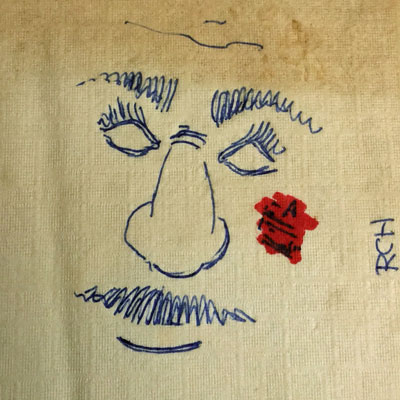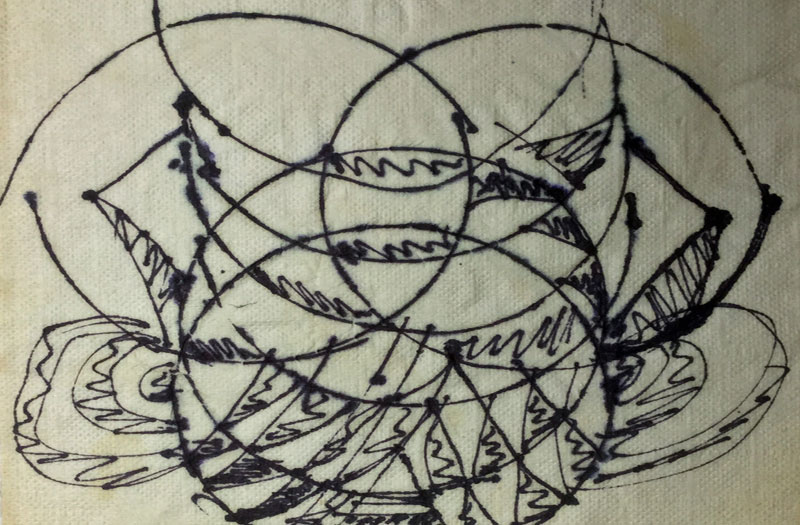I am washing dishes at The Frolic Café and keeping my mouth shut about a past I’d like to forget. I’m living on the north coast of California right up against the ocean where the air smells like salt and fish and seaweed and where it rains in buckets and the wind blows hard. It’s not the life I thought I’d be living. Maybe I’m not here at all. Maybe there is no me.
Everyone ignores me. That’s fine. People speak about their most personal lives right in front of me as if I can’t hear them, the men at the round table in the coffee shop, the tourists who always sit upfront by the windows, the locals who hide in the dark spaces to do what they do, and even the cooks in the kitchen. To them I’m one of the nobodies, silent and invisible, hiding myself in front of their eyes.
I go about just like this. I don’t look up. I don’t speak. I bus dishes from the tables and take them into the area behind the kitchen where I wash them with only the sound of the dishes banging and the washer humming. If anyone asks me a question I say: “I don’t know nothing.” That sends them off in the opposite direction shaking their heads.
Actually, I know a lot. I know all about them and all about everyone around here. I remember everything I hear. I never forget a face or a name or who said this or who said that. I could say plenty, more than you might think looking at me. But I never judge, never. And no one ever asks anyway.
A gray plastic bus tray slams down on the stainless steel counter next to my sink. The trays come in piled high with dirty dishes, uneaten food, and trash. The first thing I have to do is to pull out the trash and garbage and dump it into the large garbage can under my sink. The boss told me on day one that the silverware and dishes were expensive. He sometimes does a random search of the garbage can. If there is silverware mixed in with the garbage, he docs my pay. I don’t know if it’s legal but what can I do? He pays me in cash so I can fly under the radar, a nobody. He doesn’t ask questions about my past. He keeps a running list of broken dishes and who breaks them. Those that do don’t last long.

Napkin Art, Sea Gull Cellar Bar, artist Roy Hoggard
Separate, rinse, load, dry, stack—over and over in Zen like repetition. One of the janitors here is waiting for a pebble to roll across the waxed asbestos tile floor in the middle of the night so that he, like the Zen monk Kyogen, can become enlightened. Sometimes I hang around after my shift at night to talk to him. He told me the story of Kyogen. It hasn’t happened to him yet, but he expects it anytime. I think it will in the future. But, why wait for the future? I became enlightened soon after I started washing dishes. The job and I became one. It just happened, a sort of merging with the world around me. I can’t explain it. I know what he is waiting for, but I can’t tell him anything.
The people who work here are not what they seem. They’re authors, poets, musicians, scientists, attorneys and who knows what else? It seems that to work here you must be somebody else. In another time maybe or in another place, the future maybe. Sometimes I see the future, but I don’t tell anyone about that. I like to fit in. I’ve never told anyone who I was before or who I’ll be in the future. When I first started someone called me Mac. I don’t know why but now that’s my name. When anyone asks me my name, I just say Mac. Mac who busses the tables. Mac who runs to get stuff. Mac who washes dishes. I am physically and mentally one with the job—separate, rinse, load, dry, stack. I am so thoroughly dissolved into the work that yes, there is no me.
“Trench Coat is in the back of the dining room. He exposed himself to the waitresses again.”
“Oh, Christ! I don’t want to deal with him. Have Mac get rid of him. Tell him to scare him good this time.”
Trench Coat comes through town every few months. He wears a long black trench coat that hangs down onto his rugged brown boots. He has black greasy hair and yellow teeth and dirt and scum under his fingernails. Under the trench coat he wears nothing at all. He’s known to open his coat when a waitress comes to wait on him. All the girls know about him. When a new waitress is hired they send her to take his order. That’s her initiation. The shrieks and cries and sometimes laughs can be heard all over the restaurant. If she survives, she stays.
The boss doesn’t want Trench Coat to come in anymore. I go into the back of the dining room where Trench Coat likes to sit hidden in a corner. He looks up at me with an odd smile.
“You’ve got to leave, Trench Coat, or the boss is calling the sheriff this time.”
“I’m hungry. Send me a waitress to take my order.”
“None of the waitresses want to take your order. You really have to leave. The boss is very angry. You better go out the back door. I don’t know what he might do if he sees you going out the front.”
Trench Coat looks at me with glazed eyes. Sad eyes. He’s ugly and pitiful. I feel sorry for him.
“Look, leave out the back. Go around to the garbage area behind the restaurant. I’ll bring you something to eat. Get out of here and don’t come back. The cops will take you away to the nut house. They’ll stuff you full of drugs there that turn you into a zombie.”
Trench Coat left through the back door. I went back to the front of the restaurant where I seldom go. The boss doesn’t like me out there in my dirty apron.
“He’s gone boss. I don’t think he’ll come back this time.”
“Thank God. Now, get back to work. The dishes are piling up.”
“Yes sir.”
On my way back I pick up some bread and cheese and steal some bacon off the grill while the cook is busy with a waitress. I wrap this all in tinfoil, put it in a white to-go bag and take it out the back door. Trench Coat is nowhere to be found. I wait as long as I can, but he doesn’t come. Finally I leave it next to the door and go back to work.
Separate, rinse, load, dry, stack. Separate, rinse, load, dry, stack. When my garbage can is full, I go out back to empty it. The white to-go bag is gone. “Good,” I say. “Good.”
The Frolic Café was many things before it was the Frolic Café. It was a blacksmith shop, a Greyhound station, a Gospel Hall, The Little Club, Casa Mendocino. People say ghosts still roam through the place but I’ve never seen one. I ask the janitor about that one night. His piercing black eyes look away and a shy smile crosses his lips.
“I’ve never seen a ghost, just Ernest the skunk.”
Ernest lives under the building and comes out at night to rummage through the garbage area which is an enclosed area outside the back door where there is a large dumpster and a space for piles of boxes and other kinds of trash. The boss tried to shoot Ernest once. He took a 20-gauge shotgun and one shell out to the garbage area. He waited until the sheriff drove by and flagged him down.
“Hey Officer. I’ve got this skunk in my garbage area that’s stinking up the place. I want to shoot him. It’ll take just one shot. I’ll shoot him while he’s in the dumpster and the garbage truck will haul him away tomorrow. Clean and slick. Any problem with that?”
The Officer looks amused.
“No problem at all. Go ahead. Don’t go shooting that gun in town again though, or I’ll have to arrest you,” says the Officer says with a laugh.
“Thanks Officer.”
After the sheriff’s car turns north on Lansing Street, the boss stands on a metal milk box and points his shotgun at the skunk in the dumpster. He waits for a good shot as the skunk roots around in the garbage. When he sees his chance, he pulls the trigger.
“POW!”
The smoke clears and there’s Ernest still rooting around in the garbage.
“Damn, I missed him,” says the boss. He goes back inside.
No one has ever tried to kill Ernest since.
……………………
The grease renderers come by in a large truck filthy with grime and dust. The son of the old man who owns the company comes in the back door.
“We’re here to pick up the grease.”
“Okay, I’ll tell the boss.”
The grease from the kitchen grill rolls off into a metal trap that I empty for the cooks when it gets full. I pour the grease into five gallon white mayonnaise buckets. We store the buckets outside the back door of the restaurant. The grease renderers pick up the buckets once every few months.
“What do you do with that grease anyway?”
“Back at the factory they mix it with grain to enrich the feed for the cattle. They love eating their own grease.”
The kid smiles at a cute waitress that walks by with a wiggle to her hips.
“Grease to cows, cows to grease. Ashes to ashes, dust to dust.”
“What’d you say?” asks the kid. He really doesn’t care. He’s watching the girl.
I say nothing. I’m nobody.
The kid walks back out to help his father shaking his head.
………………..
It’s Sunday morning. It’s really busy. People are lined up out the front door into the street waiting for a table for breakfast. Suddenly there’s a scream coming from the kitchen. Then all the cooks are laughing. They laugh so loud that all the people waiting too long for breakfast with scowls on their faces start smiling and laughing too. Suddenly everyone is happy.
“What happened?”
“Red haired Sandy dropped the bucket of pancake batter and the thick white batter jumped up splattering itself all over her, in her hair, in her eyes and face and arms and all over her cook’s outfit.”
“No kidding?”
“Go see for yourself.”
I dry my hands and walk toward the kitchen. Sure enough there’s Sandy with batter goo all over. It’s starting to crust up from the heat of the grill. She’s wiped her eyes clean and is back to cooking. There’s no time to clean up the mess. People are waiting for breakfast in a line clear outside the door. There’s gonna be a lot of dishes.


AH! such it life on the North Coast . . . . . .
And all this time I was thinking . . . . . .
Never mind . . . . . it wasn’t important anyway!
Brilliant! Was that the Sea Gull?
The Sea Gull was the inspiration. This is fiction, not history, but in this case you might call it historical fiction.